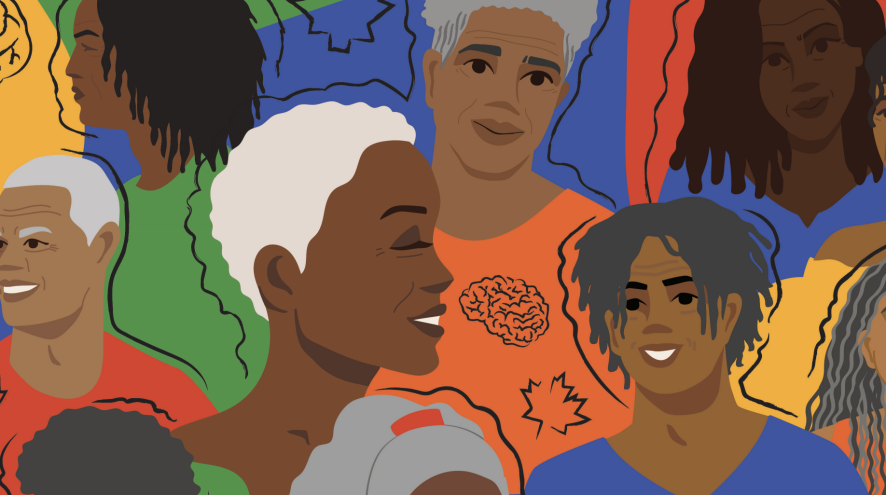Social Determinants of Health and Dementia in Black Communities
It is important to learn and address the health outcomes of Ontario’s Black population to ensure that all Ontarians have an equitable opportunity to thrive, contribute, and feel supported in their communities.

Did you know Black individuals are approximately twice as likely to have Alzheimer’s Disease and related dementias when compared to their white counterparts?
Relatedly, they tend to be diagnosed at a later stage of the disease, limiting the effectiveness of treatments that depend upon early intervention. Disparities across several social determinants of health result in the inequitable treatment and poorer health outcomes experienced by Black populations throughout Ontario.
Health Disparities in Black Communities
The social determinants of health are the conditions and systems in which people are born, grow, work, live and age that shape the experiences and outcomes of our daily lives. These determinants have an important influence on health inequities experienced within and between countries, provinces, cities, and neighbourhoods. Studies show that key determinants such as lower levels of income, less education, living in under-resourced neighbourhoods, early-life adversity, and racial discrimination can all be linked with an increased risk of developing dementia in later life.
The social determinants and their effect on health outcomes are complex and highly interconnected, with various pathways for which one determinant may influence health outcomes. Black Ontarians face disproportionately poorer outcomes across the social determinants of health when compared to their white counterparts. For example, while heart disease and stroke are among the leading causes of death among Canadians, black communities are among those with the greatest increases in risk factors for heart disease and strokes, such as hypertension, diabetes, and chronic stress.
A study from 2001 to 2012 found that diabetes rates doubled among black women in Ontario from 6% to 12%. Black women have also had the most drastic increase in rates of hypertension, increasing from 20% in 2001 to 27% in 2012. It has been well documented that these chronic illnesses are also among some of the major risk factors for Alzheimer’s Disease and related dementias, where higher rates continue to exist among black populations.
Racial Discrimination
Racial discrimination is an important determinant of health acting as a force influencing the distribution of various other social determinants such as education, socio-economic status, employment, and neighbourhood environment. Over time, disparities across the several social determinants of health result in the inequitable treatment and unequal outcomes of justice and health experienced by racialized groups. For example:
- Black Canadians represent 2.9% of the overall Canadian population, however, they represent 18% of Canadians living in poverty in Canada.
- 24% of Ontario’s Black population qualify as low income, compared to 14% of the general racialized Ontario population. Additionally, second-generation Black Canadians earn 10-15% less than second-generation white Canadians, even when results are adjusted to reflect educational levels.
- Figures from the Toronto District School Board showed that 69% of Black students graduated in 2011, compared to 87% of other racialized students and 84% of white students.
Poorer health outcomes among Black Ontarians can be seen as a result of the direct effects of racial discrimination and indirectly through each of these social determinants of health that shape and influence the daily lives and experiences of Black populations. For example, studies show that Black people living with dementia and their care partners are more likely to experience difficulties accessing the care and support they need due to barriers stemming from systemic racism and socio-economic marginalization rooted within our communities and health systems. Insufficient access to culturally safe and appropriate dementia care highlights just one example of the many ways that racial discrimination within our health system acts as a barrier to the diagnosis and treatment of health conditions such as dementia.
The Research Gap
Research from around the world shows evidence that dementia impacts Black populations up to twice that of white populations. However, racialized communities continue to be underrepresented within dementia research nationally and internationally, leading to a critical research gap in the information that is available to understand the impacts of dementia among diverse communities.
The existing research gap among these communities means that the current policies, programs, and strategies for people living with dementia and their families do not meet the needs and speak to the experiences of Black communities, leaving many people feeling excluded or their voices unheard, and less likely to seek out treatment and support.
To begin addressing this gap, it is crucial that the voices and experiences of underrepresented communities are heard, and Black representation and leadership is present where decisions are made about research, programs, and support for people living with dementia and their families.
